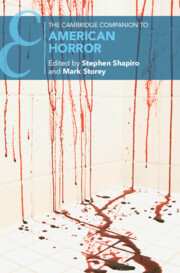Book contents
- The Cambridge Companion to American Horror
- The Cambridge Companion to American Horror
- Copyright page
- Contents
- Acknowledgments
- Contributors
- Introduction
- Part I Histories
- Part II Genres
- 7 Body Horror
- 8 Queer Horror
- 9 Folk Horror
- 10 Occult Horror
- 11 SF and the Weird
- 12 Monsters and Monstrosity
- Index
- Cambridge Companions To …
- References
11 - SF and the Weird
from Part II - Genres
Published online by Cambridge University Press: 21 July 2022
- The Cambridge Companion to American Horror
- The Cambridge Companion to American Horror
- Copyright page
- Contents
- Acknowledgments
- Contributors
- Introduction
- Part I Histories
- Part II Genres
- 7 Body Horror
- 8 Queer Horror
- 9 Folk Horror
- 10 Occult Horror
- 11 SF and the Weird
- 12 Monsters and Monstrosity
- Index
- Cambridge Companions To …
- References
Summary
This chapter examines the way two related genres, science fiction (SF) and the weird, deploy horror to critique the sources and expressions of “American horror” – namely, the dark side of American exceptionalism and the social and environmental consequences of its imperialist projects. The two genres share similar generic genealogies, but they diverge teleologically. SF is built on the assumptions of scientific rationalism and therefore follows an identifiable internal logic, relying on our implicit or explicit belief in the plausibility of the story. The weird, by contrast, is resolutely committed to the inexplicable. Both, however, use horror to disrupt our reliance on realist modes of representation that flatter our epistemological certainties. As such, both SF and the weird have been platforms for colonialist and nationalist imaginations, but both have also been potent vehicles for revealing, resisting, and repairing the brutalities of such imaginations.
Keywords
- Type
- Chapter
- Information
- The Cambridge Companion to American Horror , pp. 169 - 182Publisher: Cambridge University PressPrint publication year: 2022

